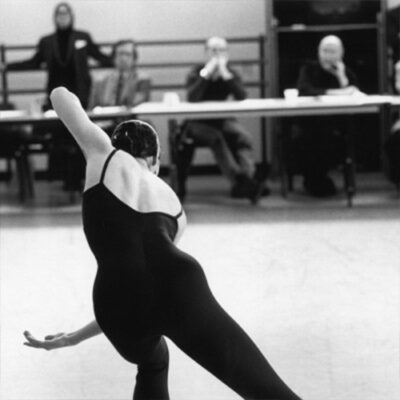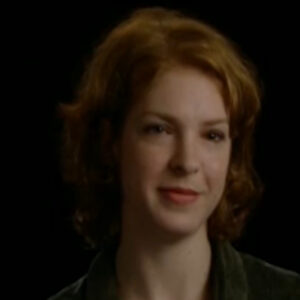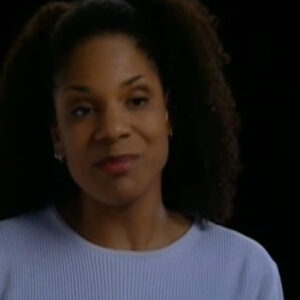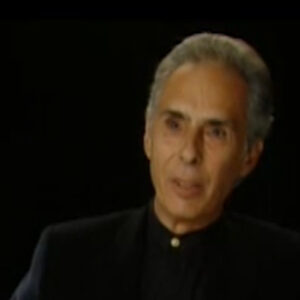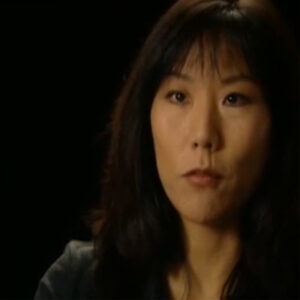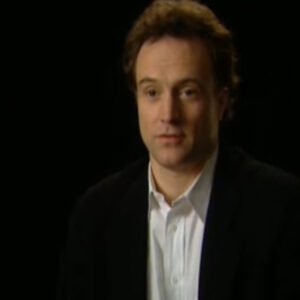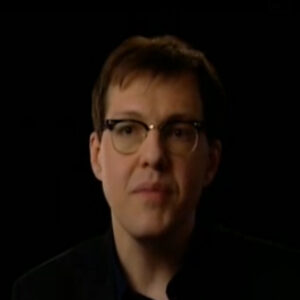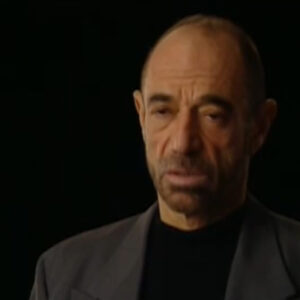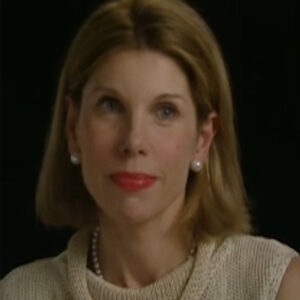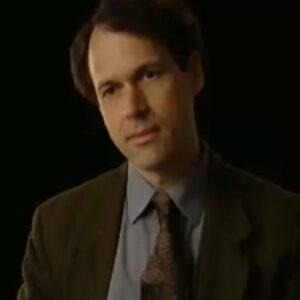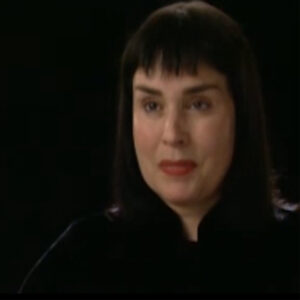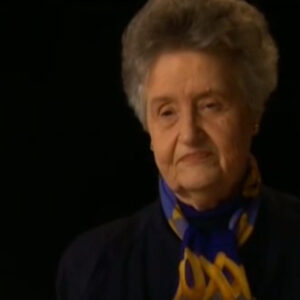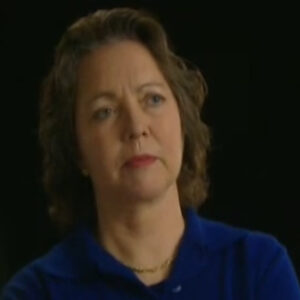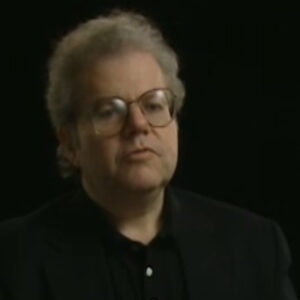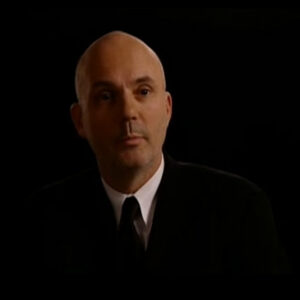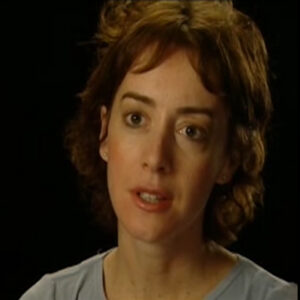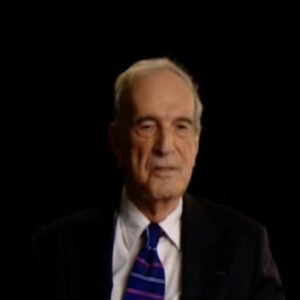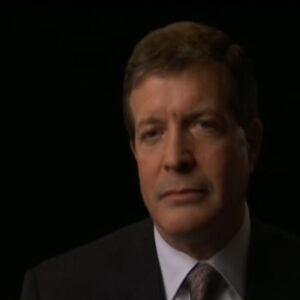Speaker Well, I came there about 12 years ago, and there was no real structure to the dramatic part of the vocal arts department. It was all vocalizing and, you know, music, learning this and but there was no genuine attempt being made to make these people truly act, learn how to act. And I thought that by having I had just at the same time, actually, I was working at the Actors Studio. I was the so-called artistic director of that place for 10 years. And for a while I was doing both jobs and I was bringing to Juilliard the kind of work that I thought was valuable for training. And it has turned out very well for them. But in it has been a slow development so that in reality, the people at Juilliard now the actors singing actors are really terrific. They’re young, they’re willing, and they can be quite strange. But because of the singing voice, they’re able to respond much more quickly than actors who just rely on the speaking voice. Somehow the music releases something. I know, and it’s been a pleasure from that point of view to incorporate that very specific kind of work that I did for years with actors. There did it for myself in my own studio and really now incorporating it within the confines of Juilliard. That’s Robin Williams singing.
Speaker I mean, the history of singing at Juilliard, as you know.
Speaker Well, I mean, there had been an opera program before and they had done productions, but it was neither associated with, say, the drama department in terms of non-singing aspects. In other words, acting, training the actors, singers to become actors in that regard. And they would do productions, but I felt that there was no genuine structure to what was going on. And that’s why I felt my being there gave them a particular kind of structure of the Stanislavski work for actors apply to singers, because, by the way, he applied it to singers very formidably in his time. And one of the best books about the subject. I also have all the kids read, which is Stanislavski on opera. So it’s been a very considerate path that they’ve taken, and I must say, I enjoy seeing someone in the first year fighting and trying to amalgamate the vocal techniques with their own private technique, which is essentially what I’m after, is that they own their music. And in order to do that, they have to become the person that went into music, why they went into music. What is it that he or she has that we we really want to know? Or in other words. As I’ve often said to them, why should I pay 75 or pardon me, one hundred and forty dollars to hear you sing? What are you going to say to me?
Speaker That I don’t know. And that can only come from what you know. And you can share with us. So it’s that ownership that I work at with them.
Speaker And that makes sense. Yeah, totally. And in terms of before your time. I mean, 19 05 choral groups. I mean, at what point?
Speaker I mean, what singing was always part. Even in, like, damn Rush’s earliest divisions of Juilliard, people have been singing there over the years. But but I mean, do you know much about the role or what what sort of portions, what role singing had in the history of failure?
Speaker Not really, no. I mean, I only know that the opera program had been there and had not had a very. Well, it had a few very interesting people who directed the company, but they were John Houseman and French director, I’ve forgotten his name at the moment, but there was no genuine, genuine program involving the talents of the singers into a an acting unit.
Speaker So in what year did the did this sort of more formalization of the opera division really begin? And at what point did you know? Now it’s like the vocal vocalizes division.
Speaker Well, attempts have been made. You know, I’d say from about 15 years before I actually came in, there were these classes with directors, you know, but it was sporadic. There was no unified approach. And when I got there, I tried to find other people that would share my enthusiasm and my sense of what training a young actor singer was about. So that I’m not just there alone now. I have people that work with me and I work with them in a series of related given techniques to help get the greatest response from them as people. And in fact, in the last six or seven years, these young people that have been coming out of the school have been snapped up. I mean, New York City Opera now depends on a good deal of a good number of them. Our rehearsals are often stymied by the fact that although they are appearing in a particular production at Juilliard, they’re required across the street to do rehearsal for their given productions. So, I mean, it’s one on the one hand, it’s a professional blessing for us. It’s becoming a bit of a curse. You know what?
Speaker Tell me about the structure of the program and how it develops. It’s all the J. J.
Speaker Well, when I arrived, it was already j o c in jail, T and J o w and I think that.
Speaker You know, the the the J. O. C idea is the there are the young professionals or about to be. And they are given a stipend.
Speaker You know, I think we’ve just got to get the audience know which JLC is due.
Speaker Juilliard Opera Center and JAYATI would be Juilliard Opera Theater, Centre Theater, whatever. And there’s a J o w, which is a youngish the youngest members. And that would be Juilliard Opera Workshop. And all of these declensions in the in the long run may even blur when it comes to actually doing productions. Because while we orient productions to each given group now every year we give two major productions centered around the people in jail, see. And then we give Jayati a particular kind of production at another given time, perhaps without quite as lavish a presentation and jailed W accordingly. But as we go along trying very hard to find material which would be good for the individual members. Each one of these groups, we find that simply an impossible task and that we need to go outside of the division very often to find people who are appropriate for the requirements of a given specific production.
Speaker That stems out of jail C primarily, which is the meaning of the words the the first higher ranking division.
Speaker So in, for instance, the present production of the Kurt Vile opera, the CUANDO are leading people. The two leading people, one is a member of JLC and one is a member of JAYATI. We could not find the young man that we needed within the confines of JLC. So rather than simply assign the role because the person there was a tenor in jail, see, we thought, no, we need to get the right person. So that’s a kind of a happy blend in a way, because it encourages each one and the various groups to sort of struggle and want to achieve another rank. You know, and it’s good. I believe it’s very good.
Speaker Do you think there’s a lot of.
Speaker Through healthy competition within not within individuals, divisions within.
Speaker How many are in the upper well they’re about in in in terms of the total number of students in the opera center.
Speaker I’d say about 80, if not more, actually 125 with all the divisions broken down and includes people who are just there simply for getting a masters degree, you know, not necessarily interested in performing. But part of the problem is that in order to secure that, they must experience performing.
Speaker So at over 100.
Speaker A little bit, if you can, about the sort of the grandeur of opera, I mean.
Speaker I mean, I feel having the grandeur of opera gets in its way. You know, it really is. I mean.
Speaker The grandeur of opera often substituted for the fact that there was nothing to be grand about. In other words, put your emphasis on scenery. Give me an epic movie, never mind who’s in it or what’s going on. And people will buy the scenery. And what’s happening now that under the guise of entertainment, that’s what we’re getting everywhere. The grandeur of opera has afflicted every grand, you know, entertainment center. Yeah. The original I mean, the kinds of operas that were done originally were mythic in subject were legends and therefore one had to supply the proper miss unsent, you know. And therefore it in that sense was grand. But that got off, got out of hand ends and and costumes and productions substituted for anything that was of any value on stage.
Speaker And we’re finding out more and more that by putting the emphasis where it needs to, particularly in an in at a time where minimal approaches to the arts is sort of on the upswing, that the grandness fits the grandness or the degree of grandness at any given subject, you know, otherwise what would playing into is the usual myth of oh my is isn’t opera grand big people and large ladies with enormous voices who just stand there, who are their own scenery being grand and monolithic sets. You know that the various attitudes that have kind of killed opera in captivity as being something brontosaurus like, you know, rather than what I’ve been trying to do. And many people like myself trying to make opera a genuinely exciting living experience, as might affect my reputation as an opera director, has been based on bringing that into the American opera scene as far back as a production I had of Traviata at the New York City Opera. Oh, many, many, many, many years. I can’t recall what it was that turned the whole thing around because people will regarded the Camille was being regarded as a woman, a creature, not just an opera fact, you know, an operatic diva and. It’s quite an interesting problem to see how one can take these works and if there’s anything really going on in them, they become extraordinary when treated as as believably, as realistically, as convincingly as possible. So that was an enormous difference made. And unfortunately, in the path toward it, we got invaded with the European euro trashed, which was borne out of their own cynicism, their own disaffection.
Speaker Opera was, you know, you walked out the door of the Opera House was nearby. And how many ideas can you watch and how many bombs, you know, instead of treasuring the possibility of making them more pliable, more alive? They tended to bring that kind of cynicism. In fact, many of the people who created these Eurotrash productions were people who hated opera and were using the occasion to trash it. There’s the word and the euro means they usually came from Europe. So it is. Unfortunately, it sprang its claws into America.
Speaker And we now are afflicted by any number of these pseudo attempts to make opera chic grande in a in a in a in a called trashy sort of way and have moved away from where I think opera needed more and more to go. And that is to make it more like the living theatre. And of course, you look at the theater now, they’re not interested in serious theater. Mostly it’s entertainment, usually because they have to run away from whatever it is in their lives that pursue them, that they don’t want to pay 75 bucks to see onstage. So it’s a real problem now about how to create within America and among amongst the academies that represent musical training, a real approach for these young people who have, after all, a young American. And, by the way, not only American and we were flooded with Europeans. I mean, we are literally mobbed by every kind of ethnic group. One day I walked into Juilliard on a Saturday morning for a rehearsal. I looked around. I thought I was on the set of the last emperor of Bertolucci’s just one large congregation of Oriental kids. I said, Good God and all interested in music. Simon Opera. Someone just instrumental playing. But how to take these people? And inculcate a genuine value because they come with their dreams. They come with their idea of what they can contribute and then are faced with the formidable so-called traditions of their various disciplines and are very confused as to how they contribute to it. So right now, we’re caught betwixt and between. In my own work, I insist on this private ownership, on the sense of self involved in their music, that they bring their own knowledge and their own integrity in terms of experience to it and hope that that will carry them further. And I’m gratified that I often meet young people who’ve been part of our classes who are grateful for that. But I, I don’t know how how much longer this kind of training. I mean, after people such as myself and others like me go, where will it go? I don’t know. I don’t know, because the theater certainly is not like when I use the word theater, I use music to is moving toward a. An almost. I don’t know what’s with what’s the word, the correct word for it, but it has a kind of almost sometimes I feel and tie human view of itself. You know, it’s as a as a kind of a gadfly, entertaining situation, which means anything goes. Values don’t count. General values, popcorn values, you know, so grand opera was originally the popcorn of theater and the view that it was a spectacle. Usually devoid of any meaning, I love a phrase that an English critic once said at the time of G.B. Shaw. What was his name? I’ll think of it a long way. He writing about performances in opera. He said if someone on an operatic stage raise their right hand, you knew there was something a put if two hands went up. You knew it was a calamity. So what’s a good way to describe grand opera?
Speaker Do you think that the I mean, there’s some there’s some there’s some pretty legendary divas who are who are at Juilliard. I mean, we actually are going to speak to to Leontyne Price and Renee Fleming. How do you think that the training, the kind of the world that they were at?
Speaker Juilliard. Well, I worked at Renee Fleming in a production, and I also am going to work with her this fall for a great performance series at Lincoln Center. And I also tend I think we’re going to work together on a Traviata, which is imminent in Texas in a couple of years. She’s one of the rare phenomenons. And by the way, one of the reasons that she is as successful, I think, is not just because she produces a beautiful voice, but she is a wonderful, intuitive actress who allows that value to be second to none in her singing. So that she probably right now, I would say, is one of the very best actresses in opera. And that is perhaps not as stressed as it needs to be.
Speaker I guess at some point when they when there’s another perspective, overview or whatever you want that has to be mention. There have been people like Carlos, of course, who retains that that image, that combination. Teresa Stratus and her own very special way had that. But we hear very little from her now among the young singers. There are a plethora of wonderful people, but they have not become stars yet. And Renee Fleming represents, in my mind, the apogee of what fine combination of acting and singing is all about.
Speaker Now.
Speaker And what’s been the sort of legacy? You know, we are talking about Rene. You weren’t teaching when Rene was a student.
Speaker No, as a matter of fact, I arrived the year that she graduated, and I saw her in her final performance of a thing called Casey at the bat. By William Schumann and I, I know I said a nice singer. Young, lovely. But I did not come into contact with her again until many years later. And that’s the great surprise that she was so ready, receptive and able to do it.
Speaker And you see that students today. Well, what happened to the. How hands on is the work with not just yourself? Well, how rigorous is it to be?
Speaker Well, I’ll tell you, it’s vigorous on both sides. One of the sometimes unfortunate elements in this is that the training that I do is not either understood or is given sufficient inclusion in the so-called separate vocal technique. And there often arises conflict in that department as to how to incorporate the two, you see. So it is rigorous and vigorous on both sides and very often it can create conflict for them. But my feeling is that if there is some deep necessity, like, you know, an actress, if you really want to do it, you will do it. But.
Speaker If you don’t, they will drop out. They will not show up.
Speaker Those who do show up benefit. Some people start out by hating it. I mean, one young lady, I mean, she made no bones about it the first year. And then gradually she understood what the value was for her. She was frightened.
Speaker Because after all, it’s one thing to be a singer and go home at night. Take the voice out of the throat, put it in a jar. Shake it around in the morning and put it back. It’s frightening. The voice is always regarded as some special, distinct instrument that you must protect and coddle without taking into consideration the rest of the human being who’s singing. That’s why one of the things I constantly emphasize is that you are as good as the voice you have the day you sing. You must learn to sing with the voice of the day. You must learn how to accept that. And that means being willing to take into account all of your foibles, understand them, work with them. Otherwise, you’re always hoping, like some terrible joke, to be as perfect as you were in the bathroom, in the shower constantly. And failing when you know that the voice always sounds differently. Every day. It’s part of a self-awareness. It requires conscious awareness of themselves, what their values are, what moves them, what dozen, what their fears are, how to work with them. And that is about as strong a way of going as possible.
Speaker Since I rely on them, I rely on them totally to give me the information I need to work with them very often in the opposite apartment, you know, in the vocal technique. They are told simply what to do. I mean, there’s a simply down the line technique about how you produce the sound, what you do with the job, what you do and throat, you know, which sometimes doesn’t consider the rest of the human being. And I think problems arise. So it’s interesting when singers give up a teacher and go to a new and suddenly they become inspired. The new teacher is great when in reality what they’ve done is let themselves go, you know, for a moment. And then, of course, what happens is the same problem occurs again.
Speaker Teachers must learn. I think all the way down the line to appreciate the specific differences of these people and to involve them into why they are singing what they’re singing about. And to be able to accept the differences as part of the way you develop vocal technique. I struggle with that problem constantly.
Speaker You know, your your teaching style here, teaching style, your class. I’ve been in your class.
Speaker Mean actually it’s actually quite, quite a rowdy class and you’re actually always sort of. I mean, what what is your. Tell me a little bit about your style. I always feel you’re you’re pushing them and it’s quite, quite a lot of laughs.
Speaker Well, I try to stimulate them. I try to also try to strip away from them. These these terribly. Sad, predisposed ideas of what it means to be an opera singer, to take the doubting this out of it, to take the stuffiness out of it, to somehow make it something that belongs to them rather than something that they must worship and bough and kneel to, you know, and to understand that unless they do that, there’s no reason why they should be there.
Speaker Probably to have 100 people all sing the role the same way the song the aria said was ridiculous.
Speaker But yet there is a subscribed idea of what style is, what tradition is, which usually means. I know you don’t. And I always find that a very lamentable condition because it does not take into consideration the people who supposedly dumped, but they know something and that’s why they’re there. And to make them aware of that value takes a little doing, stripping away a lot of preconceptions, teaching them to respect their own point of view on whatever level, because most of them are frightened of it. They don’t believe that they have a right to it. I’m here. I don’t know anything. Tell me. Well, on the contrary, they know a great deal. That’s why they came there. And that private inspiration is what must be kindled by what ever manner and means. I also am very informal in my teaching. I purposely don’t cater to holier than thou. I believe that that unfortunately, at that age, they still look for mamas and poppers, which is sad. And the ones to tell them what to do rather than to encourage them to think for themselves. It’s a very different proposition.
Speaker And you think you know a little bit about sort of the mythology or the sort of Juilliard. I mean, people come to Juilliard, you know, just the name alone. I mean, well, it’s not what what is really what’s the myth and what’s.
Speaker Well, it’s a blessing and a curse, you know, blessing in the fact that I start at the beginning because my question during the movie was a blessing and a curse.
Speaker Well, the problem with a place like Juilliard is that essentially it is a school, but it is situated at Lincoln Center.
Speaker Now, that immediately puts them up against the wall. They somehow are part of the whole competitive complex in some way. To protect the young people is very important, very serious matter. And by the nature of what it is, the nature of publicity, the nature of the media, it tends to get into the works. And Jimmy the works up so that things are not often done just simply for the sake of be the student. They have to somehow be able to do their work. And yet it is part of a larger media outlook and that’s problematic. And we’ve been struggling for years with it, trying to find a proper balance. In fact, part of the problem, the critics regard the school not so much as a school. They see it somehow as part of Lincoln Center. And very often don’t really observe and and respond critically to what they see in other in terms other than the usual.
Speaker What do you call it? Protocol apply to any given production taking place in any of the houses on at Lincoln Center. So there is their problem. Matter of fact, I advocated over and over not to allow critics in, you know, to to to judge these young people. The drama department many years ago under John Houseman literally did that. He refused to allow them in. And that is important. And they have been able to work with that anonymity and produce whatever it is they produce without feeling the necessity of having to be either getting good reviews in order to get them to or their agent in order to spring their career. These are our concerns, certainly that affect all performers, but somehow at the stage they’re in at a school. It’s a hard thing to balance. You know, that’s only one aspect of it. And the fact that they are constantly invaded by masters in the various divisions of accomplishment, all who come in with various points of view and who more often than not are imposing their points of view on the young people without either knowledge of who they’re dealing with or any actual concern, rather than a private platform for themselves, which only confuses the young people. It becomes problematic on all sorts of levels that have to do with how private does the work need to be, how to protect that privacy, how to nurture it, and then how to allow them the leeway to to bring that to the fore without worrying how it’s going to be received. So the nature of how it’s going to be received will often cause difficulties in the business of arriving at results.
Speaker But do you think that there’s a kind? I mean, Sarah Wilson is one of the students that I’m following with quite adorable girl.
Speaker Yes, she’s wonderful. By the way, there’s a girl who started being very, very reclusive in her work. She was proper and sweet. One could see there was a talent, but she was holding onto her anger, holding onto a lot of things. And she started to do work in my class. And but now we’re trying to think of a of a of a project for her because she let herself go and but only that. But her own sexuality was was released and she was seductive and winsome at the same time. So it’s wonderful.
Speaker Call.
Speaker But one thing that Sarah said when we interviewed her, which I thought was sort of interesting, is she said, you know, that she had been, you know, quite a big shark in her little pool before she came to Juilliard. And I mean, talk about the the level of talent, the process of people coming in. I mean, how. Competitive it is to get there and when you get there, how talented is that? What what?
Speaker Well, I mean, you know. The competition now. I mean, competition is competition, meaning that they they don’t come in bad each other all over the head. You know, they do try to audition. And in the long run, we will have, you know, as in all auditions, there are a small number of people that we feel that we would like to have in the school. Right. That’s only the beginning of the battle. Now, by the way, when we audition, not only do we make them sing something, we make them act something. They do a monologue so that we see whether there’s a human being behind all that localism or not. And I often work with them right there to see how they respond. But that’s just the beginning, because then what happens is that they’re all aiming to get into jail, see why JLC Well, it’s the top of the heap. Which means that they will get a stipend money to support them while they are studying. But. The obverse side of the coin is that there are now in this country a very wide dissemination of similar organizations, opera companies, academies. One of them I actually helped. I started in Houston, Texas. Years and years ago was the original beginning of that kind of program. That now is. Is Legion. And we have to deal with their competition. Eh, they offer more performances, they offer very often more money. You see, they don’t offer a furrow scholastic foundation along with the work that we do on them as performers. So then we are in the position of waiting to see where they will go, whether they will accept our program for whatever their particular reasons are, or whether for the sake of money, they would prefer to go to Euston or Chicago or where or the Met. We are constantly, in that sense, having to fight for our talent, and sometimes we have to wait until they make up their mind. So the competition is strongest, not necessarily between the students, but in the the. Other institutions and other organizations vying for that talent. And at the same time allowing a perhaps more munificent come on.
Speaker What do you think? What do you think has given this incredible Juilliard?
Speaker Well, Juilliard has been here is you know, it this I don’t know if it isn’t the oldest grand academy of music in this country. I mean, I can’t think of any about that has its own very special history and its cachet. And so it has preserved its high standard. In fact, because of that, it has tended not to want to jump into the fray, which is, you know, well, the Met will will give offer all kinds of moneys, these people for their studio and the kids jump at it. They need the money. They want the money. It means arriving. It means their career is started. So the school is in a conflict right now. But the nature of how to appeal to these young talents and yet preserve the scholastic standards which are nowhere else available to them in any of these other institutions. So the competition is between the institutions, not within the actual members of the singers in their problems individually.
Speaker But I guess what I’m getting at is that don’t you think that in some way people once people get into Juilliard, they feel in some ways that they were right.
Speaker Truly artists?
Speaker Well, I’ve implied that by saying it’s the number one school in the country and it probably it. Entertains and invites and has the most prestigious faculty. You know, to facilitate the requirements of the school, and that certainly is a very big and important part of why people are coming to this school. You know, people who not only teach, but who work professionally outside, you know, composers and conductors. And so it’s it’s in every sense of the word. It is. It is probably the most serious and the most career oriented academy of music that is operating now. And it certainly has the cachet of having people on their faculty who are associated with preeminence, prominence and success. So therefore, naturally, these students would like to have a little of that rub off them. And by becoming a part of that school, one assumes a guarantee that magic will occur for them.
Speaker And then, of course, you know, you’ve got to do it yourself. I mean, would talk a little bit about this sort of struggle of becoming an artist. This sort of that point. And you work on typically in your class, but sort of taking that technique in. And what the school is giving you is technique. And you have to bring whether it’s even the technique as an actor and the artistry is coming from somewhere else.
Speaker No, it coming it’s coming from. Usually there need to sing. In other words, why is it that these kids from Ohio, from Wisconsin, from Washington. I we all over. Why are they why do they want to be opera singers. That most ancient of tradition, you know, somehow that music fulfills something in their their dream of self, that vision of self. The music somehow touches them very deeply. And it’s that. Eventually. Probably I had a heavy lunch. Is that predominantly that? Will make artists Southern in the sense that they are willing to let it all hang out. Which the great artists permit, that you get a sense while you’re sitting there listening that you are hearing an echo of your own experience reflected, by the way.
Speaker That’s why I think singers are paid and our actors are paid, that they reflect in the deeper sense the desires that most audiences cannot fulfill for themselves their own visions, and that there it is a living presence. And that’s why it’s so surprising to me that there seems to be such a an effort to downplay the deep seriousness of all of their own intent and the intent of the young people who go into the profession in terms of public display, in terms of what is available.
Speaker We’re on a strange. Course in our theater, maybe the opera. After all, in opera, you’ve got to remember, despite Eurotrash, whatever crash any anything. A second rate, Tyree’s is better than most stuff that you get anywhere else in the theater. Because at least one can rely on the fact that these works reflect the level of genius of, you know, original inside of great art. That is not easily come by. And it’s, of course, not a. a happenstance that these most of these works derive from the past. At a time reflecting a time that took the art seriously as part of an every day occurrence. And yet that very same reason we are getting the Eurotrash backlash against it.
Speaker That’s why his offers so notoriously this world of Deaver’s drama.
Speaker I mean, you know, you even see it in you when you’re in the school, the dancer personality, the actor personality, the opera personality.
Speaker Well, it’s not that, but I think it’s studied. And I always find that those people are highly self-conscious people. Well, you know, and we laud them. We turned them into icons of some kind. I mean, I. I don’t necessarily go for it. I think the Campi all of them. You know, when they pull that routine, great diva, the great dancer, you know, they’re great despite their campiness. But if they insist on those images, well, it’s like a bad Gloria Swanson movie ready when you are Mr. De Mille. I mean, you know, I really have no truck with that stuff. She I think it’s fear. I think it’s an attitude hiding self. It is an imitation of something glamorous. And the word glamour means fake magic.
Speaker So you are getting a reflection through a glass darkly in that, you know, and usually the grand divas and all of those people are the their jokes, one laughs at them as much as one sort of aspires. And there’s a certain element in society that always wishes to have their camp and eat it, too. You know?
Speaker Talk a little bit about some of the productions that have gone on this year. You’ve seen all of the Army and Midsummer Night’s Dream. Have you seen that? Well, I saw I mean, I saw The Midsummer Night’s Dream a little bit about that army and that and that production.
Speaker Well, I mean, you’re putting me up against the wall. You really shouldn’t, because I did not like the production.
Speaker I made by my feelings very clear. So I don’t think it’s fair stating that.
Speaker Yeah. I suggested that this is an interesting I suggest that the opera for a particular young singer, monarch, Monique McDonald. I thought that she deserved to have a particular vehicle for her. And I suggested that work was. It had not been done. But my feeling is that, again, one of our problems in the school is how to get together a group of directors who work together and have a kind of a not the same attitude, but who work within certain parameters and are aware of one another’s leanings and how to really develop the art form. And I felt that the one thing that was missing for me was the very thing that what the work at the school is about for the singers, and that is the human experience. It seemed to be devoid of it. It seemed to be conceptualized. And and the concept, the what? The tail was wagging the dog. And A Midsummer Night’s Dream, however, was something else. The second act of that production, which was improvised but very little part of the idea of doing a minimal production, was delightful beyond belief. I mean, the resonance and why all of them came alive to themselves. They played as they are. They were willing to share one another games. It was a game, as the piece is. And it was absolutely delightful. And the director was willing to allow that to happen. This is a person who at least works in a manner that’s conducive to working with actors. So, I mean, those were two diametrically opposed points of view.
Speaker Do you I mean, do you really encourage that? You know, I mean, Sarah actually was saying I mean, early on, you know, you’re there, you’re the school, you’re a fledgling. You’re not really getting stuff, but really loving that point. Like, say, just the opposite. So things that are upstairs, the intimacy, the theater and just using the black box. Yeah. You really I mean, talk a little bit about encouraging that.
Speaker Well I mean that, that those things you see are what I call partly the relationship to the work that they do in the classes, that the scenes that come out of the classes very often are so special when they occur that we gather them together like wonderful rosebuds and present them as an evening of accomplishments. And of course, we then may add to them in order to fill out the evening, but it’s part of the actual work that they do. And it’s very often much closer to the of the work that they do with their coat, their teachers. Then when you actually get into a production, you know, a major production. So they’re wonderful and they are useful because they flex the muscle. And it allows them, by the way, to repeat, you know, what they accomplished and hone it. And they have a freer, more relaxed approach than when you’re stuck with, you know, just three given evenings when you have to produce that may or may not reflect what has been going on. Now, you know, our productions try to represent the best talents that are available to us in the in the various divisions. But very often it becomes difficult to find a piece that will really work for everyone in that particular class. So very often we take a chance and say, well, this will be very good for them. This will help them further the work that they’re doing. And I have I’m a great lover, a play play of gameplay and improvisation and letting oneself go. And I emphasize that as a very important aspect of their work in which they are allowed to sort of be in their own playground.
Speaker Do you feel an obligation as the artistic director at a place like Juilliard to.
Speaker You have your singers thought about something, you feel you’re living up to our responsibility Earth?
Speaker Well, sure, I feel a lot of responsibility for it because, I mean, in terms of my own work, what I’m after, what I I’ve been a teacher for many, many years. And I I took the Juilliard position because I was doing the kind of work that I love to do on a private basis. But also I was doing them in the productions that I mounted in opera. And tried to get the singers in there. I was fortunate that all those early years with the New York City Opera, I had people who responded and were willing to go along with the idea and to humanize themselves and humanize the experiences. That was the great difference in my productions from the so-called Grand Opera Productions. It did not mean that I did not add theatrical lives than I did. But essentially they were as people that you were interested in. And for me, that is an imperative in my teaching so that when I have the opportunity to go to Juilliard, I thought, well, this is wonderful. I can really over a period of, say, two to three years with each one of these people and the various divisions be able to to help articulate the talent within them in a fresh and giving them, by the way, work processes that have not been part of opera. Really. The call it whatever you want, the Stanislavski method, which you can stretch forever. The terms of its meaning has not been part of training for the singer and has only become so in the last 20, 25 years.
Speaker And when you leave your division. How do you think they’re perceived?
Speaker Well, I warned them, of course, what they’re going to meet, that they what I try to do is to make them aware what it is. They do have ways and means that they have a being able to inform themselves about themselves in any given circumstances and role, even under the most dire full conditions. And in very often, you know, they have to do instant opera. How to deal with that idea of singing with what you have. Use yourself. Go to yourself. These things are terribly valuable. And I have seen them put to very good use. Like I love meeting people along the way that I’ve worked with in this particular production of Cool Handle. I have a gentleman that originally worked with me on the world premiere of Mice and Men by Carla Floyd, who played George Julian Patrick was playing the general and we couldn’t get anyone at school who could sing that role. And yet we wanted to do the work. And we called on Julian, who also teaches, and he came to us. And that’s part of a very large circle of family that occurs within these given parameters, I hope. And I tremble for everyone who works this way and goes out to try it. I can only say, though, that we give them some private sense of their own particular worth and how to get at it. That can only help serve them in their sense of developing a career for themselves and allow them to be satisfied that that’s what their career is about. Some private fulfilment.
Speaker Because if you’re looking for stuff, if you’re looking for a.
Speaker They are going to be you no, I don’t I don’t think I think we can avoid that. It’s how you go about it. You know, I mean, you know, the trouble in our lives is that we know the things happen outside of our ability to control them. And that’s part of our willingness to go on and accept that premise.
Speaker So we’re lucky if something’s come through and some things do not. But that is also a technique of technique, of accepting that. So the technique allows them to accept what it is they have and how to use it and not to be tossed about like a salad. They not know what it is that they can or cannot do.
Speaker I have one other question, though. Can you just say Sarah Wolf’s name? Because when we were talking about Sarah, I said her name Sarah Wolfson.
Speaker One more time.
Speaker Yeah. You want me to say, yeah, you might cut this thing? Yeah. Tell me what you think about her.
Speaker Well, I think Sarah Wolfson is one of the genuinely talented young people I’m working with, primarily because I have watched her very quietly get out of her sort of adolescence emotionally and become a very spirited and a rather deep young lady. And for me, she projects qualities that are very special. And to find that essentially is what you’re trying to find and help create in the young artist. And I think this young lady is an artist and I enjoy watching her at school doing her, you know, her work.
Speaker Good, good, good, good.
Speaker Anything major that you want to say that you haven’t said?
Speaker Oh, listen, I do want to say that no, you don’t want to tell me how.
Speaker Know it’s tough, right? Tough. You mean the whole process of being there.
Speaker Money, money, money, money, money, money, money, money, money, money, money. You know, I mean, where do you get it? Where do you get it? Here’s a school that’s got billions and billions of dollars, and yet they’re always crying poor.
Speaker And by the way, look, you know, they’re balancing quite a bunch of people, you know, dance theater instrumentalists singing.
Speaker How do you keep that all going once something’s got to give? You know, in all of that. So it’s a problem that it seems that Juilliard has been more successful in many schools that have, I don’t think, dangling that many participles, frankly.
Speaker I mean, it’s a big deal. They’ve bitten off a huge thing. Oh, not the legacy that they have. They are. Right. You know, and.
Speaker And with the world going the way it’s going and entertainment going where it’s going an.
Speaker Wow.
Speaker The number of people flooding into music, not just Americans, but the world languages. I mean I mean the Orient now is where we are. As I said, the last emperor. Sometimes I think I’m on the set. It’s amazing. The group of. And the whole adjustment. Completely new adjustment. One. And then you are dealing not only with that problem or numbers, you’re dealing with a point of view, room of how difficult it is very often to work with some of the young Oriental students. One girl finally got it to confess. I said, what is it? Why is it so difficult for you? Well, because they’re told not only must they be as good as the Americans, they must be better. So, I mean, you’re you are already dealing with some inner conflictual element and you’re dealing with a foreign body comparatively. And you’re trying to. What do you call it? Husband them and and make them part of a family while they don’t understand what you’re saying.
Speaker I want to ask you one quick question that I’ve forgotten. It wasn’t even in my notes. We’ll let you go. But what is it? Why is it an opera program and why is it not? If you can tell me the philosophy of not embracing sort of the musical theater, which is the way I have been American.
Speaker Yes, that’s. But that’s more. But that’s what I have been fighting. Tell me back.
Speaker But I’ve been fighting to get this. Now, I am now trying in the spring, for instance, you say this, I was the one who said the musical theater.
Speaker So what have you been fighting for?
Speaker To get them to do musical comedies, to get their acting is as good. By the way, when you see cool, handle your own, you see musical theater. Although it’s Kurt Vile, it’s now more than ever the musical theater of Kurt Vile that was connected with those musicals, he did it somehow. It still has disrepute for Juilliard. I cannot get out of a really set program. I wanted to get Barbara Cook in there. People like that to teach and to work on these things. And they are resistant.
Speaker Well, it’s opera.
Speaker A lot of people don’t understand. It’s a threat. It is a threat. But I make them aware that, look, you’re going to be singing probably more Sun Sondheim’s as you will be singing Puccini when you go out and you may as well prepare. In fact, what I do in my own class is that I forced them to sing musical shows and will find answers for opera. Through that, I’m now trying to do car. Floyd Collins, Adam Kittles off Broadway musical there. This next year.
Speaker And I know it’s you know, why not? Let’s try it.
Speaker Even the composer says, I’d love to hear opera singers do it. Yeah, you’ve got a very good question. I don’t know whether.
Speaker Other schools do it. I don’t know. But I do think that it’s the core of musical theater is uniquely is. But, you know, it’s baby.
Speaker But I have been doing that for one hundred and twenty two years. I consider myself the Grandpa Moses of all of this stuff. I’ve been constantly approaching opera as theater.
Speaker An opera. It is as a result of that, a special form of it. If I contributed anything, it’s that to it so that it looks like, you know, a real piece of theater not. Oh, well, here we get the fat lady is going to sing tonight.
Speaker You know what I mean? I hate that.
Speaker The fat lady is going to sing tonight. I won’t allow her to sing if I were in the theater. No. Go home and lose 100 pounds. Come back and work. Don’t be a moving set, you know. That’s the ridiculous, campy side of opera.
Speaker Sorry, I feel that I feel if you if you want to be a part of the theater, you have to create a persona that is part of it doesn’t mean everybody has to be slender, rella or done one.
Speaker But I mean to appreciate what it is, because I think those people hide, you know, they hide behind all of that stuff.
Speaker You know, and who wants to go? I don’t care how beautiful voices are, but I wouldn’t spend an evening watching two Colossus is doing Tristan and his old I can’t stand Tristan and Isolde in the first place. Never mind. Sing to Man Mountain Dean singing at each other.
Speaker Are you taking this down? Don’t you dare. No, really. I mean, you don’t put out any of this song.
Speaker No, but I mean I. But I mean, it’s just interesting to me that the musical theater is, you know, something.
Speaker This is a very important thing that I wish you had really had the moment to say that this is important for places like Juilliard to recognize its value and to try to perpetrate it, to try to supplement. Too bad we don’t have that in there.
Speaker Want to put that in the stodgy side? Well, I know it’s important. I think it’s important. I mean, I’m interested in, you know, it’s like it’s like you have to blink.
Speaker For instance, Barbara Cook was the only one who went. Came and gave it away, gave her a demonstration and asked them individually what it is. What is it they thought about the music? What did you think? What’s your idea about the others? Don’t give a rap. They’re just coming from a Mount Olympus, telling you what it is you have to do and doing it usually quite badly. Most of these people are very bad teachers. I walk out of there all the time. Incense. And what is it being done for the Needle Park crowd that pays ten dollars to come and sit before the Freedomland team price fully? And she’s a show into us. OK.
Speaker We’ll be seeing her. OK. Thank, sir. Would you be willing to do a quick happy anniversary about American answers to you?
Speaker Happy anniversary, American Masters. Yes, fine. You got it.
Speaker What’s your public with? One more now.
Speaker Happy anniversary. American Masters.

